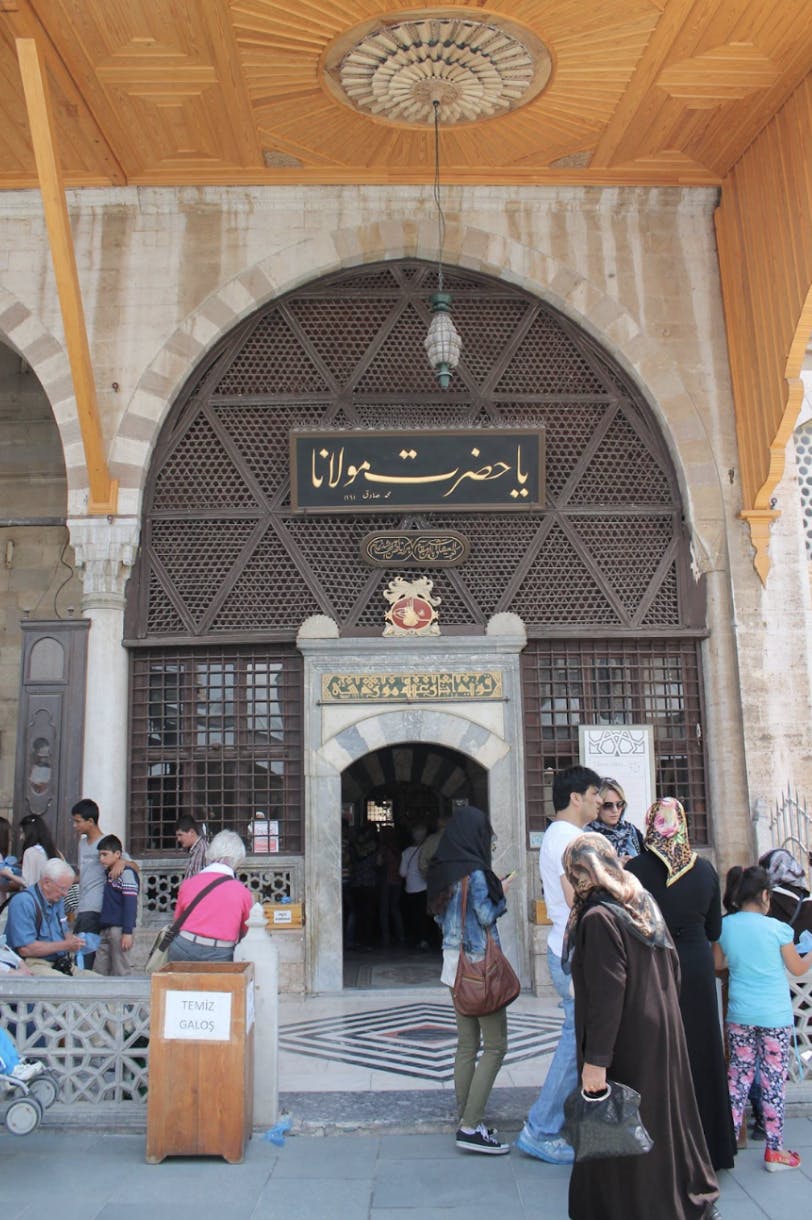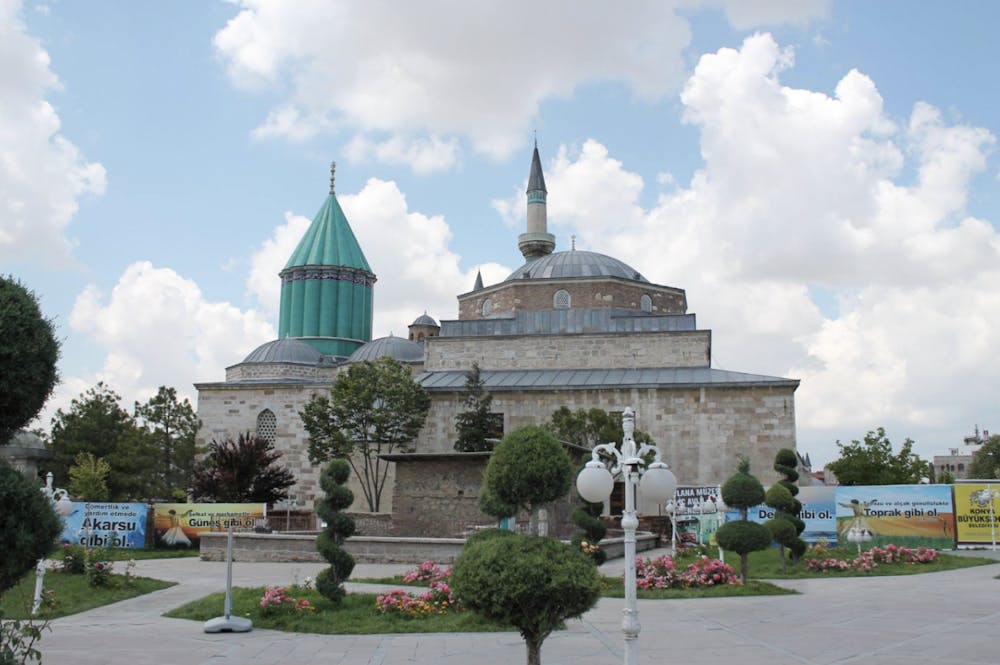Zahra Moeini Meybodi is the Associate Muslim Chaplain and Interfaith Advisor at Middlebury.
“Though faith [in Islam] rests on five pillars
By God, fasting is the greatest of them all!” — Rumi [Divan of Shams]
“Rumi” — a name that has become increasingly recognizable in American classrooms, literary circles and spiritual movements. With popular renditions and interpretations of Molānā Jalāl ad-Dīn Muḥammad al-Balkhi al-Rūmī, or simply Rumi’s writings in English, the 13th century Persian Muslim poet has become one of the most celebrated poets of our era.
When speaking of Rumi, all kinds of images are conjured: whirling dervishes, ecstatic mysticism and a spirituality that goes beyond institutional and organized religion. After all, in a famous rendition of Rumi, we read, “Out beyond ideas of wrongdoing and rightdoing, there is a field. I’ll meet you there.” While Rumi’s overarching spirituality is undeniable, the lines between who Rumi historically was as a Muslim practitioner, scholar and poet, and who he is to the contemporary American reader as a universalist spiritual guru, is often blurry, and a question worth pursuing.
As someone who speaks Rumi’s native language, Persian, and researches his poetry, I (and many others) have found that (with scholarly exceptions) popular English renditions often fail to echo Rumi’s voice and vocabulary as a Muslim, and a practicing and a scholarly one at that. Perhaps looking at Rumi’s attention to Ramadan, the Islamic month of fasting and one of the main pillars of the faith currently taking place, can serve as a worthwhile avenue for us to delve deeper into Rumi’s identity as a Muslim.
Ramadan marks the ninth month of the Islamic lunar calendar, and it is the month in which the entirety of the Qur’an is believed to be revealed by the archangel Gabriel to the Prophet Muhammad. Most notably, it is a practice in gaining what the Qur’an calls Taqwa, or consciousness of God. In order to do so, Muslims are obligated to fast from sunrise to sunset, exerting themselves in a spiritual cleanse wherein they seek to abstain from ill behavior, food and yes, even water.
So, what does Rumi have to say about the practice of fasting?
Ramadan and the Recovery of an Inner Voice
In an excerpt in the Divan of Shams, Rumi celebrates the commencement of the month of Ramadan, comparing it to a divine legion that revives the territories of the heart and soul. He writes:
“The month of fasting has arrived, the banner of [Divine] Majesty has arrived!
Abstain from food, for the table spread of Life has arrived!
In another lyrical excerpt, he depicts the effects of fasting on the human being by comparing the person to a lyre, a traditionally stringed instrument that consists of a hollow wooden body:
“Oh, the sweetness of an empty stomach. Humans are like lyres — neither more, nor less. When a lyre’s belly is full, there is no sound — and so, no lament, no highs nor lows. If fasting tires your brain, and burns your stomach — with every burn then, your heart, too, shall lament [to God].”
In colorful imagery, Rumi celebrates the commencement of Ramadan and anticipates a spiritual revival. Comparing the human being to the lyre, Rumi tells us that the fast’s physical emptying of the body becomes the cause, ironically, for discovering a beautiful melody within: the human’s calling and prayer to the Divine. The moments of loss and detachment, it seems, are actually to be embraced because they invite us to the purpose of our existence — which for Rumi is the human act of calling, loving and knowing God. It is an exercise in recovering the intrinsically divine character and essence we all have. The emptying provided by the physical fast is, essentially, a process of spiritual discovery. Taking the occasion of fasting and the month of Ramadan as vehicles for an inner transformation, Rumi’s celebration of his Muslim identity and one of the most critical Islamic rituals, is made vivid and visible in his poetry.
Love for the Beloved in Spirit and Ritual
Rumi is also deeply mindful that fasting, as critical a practice as it is for Muslims, must be done with sincerity and intentionality. He says:
There’s him who worships, fasts and supplicates - praying, giving charity and more. Yet, he has no passion for the Divine Beloved. He worships, doing the deeds, but has no hint of sweetness. His worship is empty - meaningless! A hollow seed, with no pith. Passion is needed, so worship could blossom! A pith must be, so the seed could grow into a tree!
Citing the different pillars of the Islamic faith, Rumi warns his audience that following merely the outward prescriptions of fasting is insufficient. Without sincere desire for God, these acts can become not only futile but even hypocritical. The antidote is to call out with the tune of yearning and desire for the Divine Beloved with dhawq, as Rumi says — an Arabic and Persian word denoting passion and excitement. But does this mean Rumi, as some popular translations depict, is dismissive of the outward Islamic rituals as such? No. He seems, rather, to demand much more of his reader - that is, his or her fast be done with a fullness of spirit, awareness and intention. Spirit without form, or form without spirit, would either lack direction or depth.
While popular renditions of Rumi have made him more accessible to the average American reader and those who are spiritually curious, there still exist the unfortunate complications of misrepresentation and cultural appropriation when it comes to Rumi's identity and practice as a Muslim. Shedding light on Rumi’s celebration of Ramadan, including its inner teachings and external requisites, is all the more important in an era when conversations about diversification and decolonization of literature are at the forefront of our academic education.




